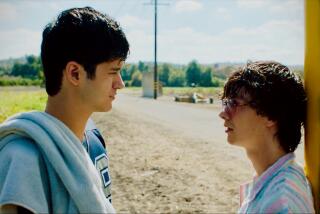MOVIE REVIEW : The Curse of Parenthood in Joffe’s ‘Alberto Express’
- Share via
Arthur Joffe’s “Alberto Express” (Westside Pavilion), a comic nightmare of a movie, opens with a delicious scene. It’s 1968, and Alberto (Thomas Langmann), a wistful, small-town Italian youth of 15, has come to say goodby to his father, Italo (Nino Manfredi), before leaving home to make his way in the world. He is told of an ancient family tradition that requires him to repay every cent his parents have spent on raising him. He must pay up before becoming a father himself or face terrible, undefined consequences.
As beautifully played by Manfredi, a past master at comedy, and by Langmann, whose eyes widen and lips waver as the grand total reaches 30,250 lire (which translates roughly into $25,000), the scene is darkly funny rather than menacing. Consequently, when we move to the present, in which Alberto (now played by Sergio Castellito), out of work, impoverished and with his wife (Eugenia Marruzzo) due to deliver any second, is suddenly so seized with terror that he rushes out of his dingy Paris apartment to confront his father, we don’t feel the motivation for this rash act. Joffe has not established why Alberto, after being away from home for more than 20 years, should so abruptly take the preposterous curse seriously. Perhaps Joffe means Alberto’s violent reaction as a comment on how overwhelming the sheer prospect of fatherhood can be; in any event, it’s as if Alberto had been shot from a cannon offscreen rather than on, and we miss not being able to experience fully what propels him.
Once past this awkward start “Alberto Express” gathers steam as Alberto, shoeless, rumpled and broke, manages to grab a train for Rome. Once aboard he experiences a series of increasingly surreal adventures through which Joffe’s main theme emerges with a burst of grace and imagination worthy of a Fellini fantasy: the soul-withering folly of parents making their children feel perpetually indebted to them. En route every manner of comic mishap assaults the desperate yet resilient Alberto in ways that recall both Chaplin and Keaton.
The people Alberto encounters on his adventure are all well-drawn: the warm, kindly conductor (Marco Messeri) who turns out to be an acquaintance from home; an acerbic former lover (Marie Trintignant); a formidable dining car waiter (Roland Amstutz); a rich, ancient baroness (Jeanne Moreau) who travels wrapped like a mummy and made up like Neferteri, and most important, the spirit of Alberto’s own grandfather (Nanni Tamma), whom he meets in the eerie yet endearing Felliniesque sequence. Castellito has a laughter-through-tears manner entirely appropriate to the immensely beleaguered Alberto.
“Alberto Express” (Times-rated Mature for adult themes) is great-looking, thanks to cinematographer Philippe Welt’s superb use of light and shadow and even tinting to suggest an aura of the supernatural. In what is only his second feature--Joffes first, in English, was the 1986 romantic melodrama “Harem” with Nastassja Kinski and Ben Kingsley--Joffe initially seems over his head, but once he gets on track there’s no stopping “Alberto Express.”
Don’t miss Sam Karmann’s “Omnibus,” the eight-minute short playing with “Alberto Express,” which deals with a harried office worker (Daniel Rialet) who boards his usual commuter train only to find that the schedule has changed, a surprise he regards as catastrophic. No wonder this gem walked off with the Palme d’Or at Cannes.
‘Alberto Express’
Sergio Castellito: Alberto
Nino Manfredi: Italo
Marco Messeri: Maccari
Jeanne Moreau; The Baroness
An MK2 Productions USA release. Director Arthur Joffe. Producer Maurice Bernart. Executive producer Alain Centonze. Screenplay by Joffe, Jean-Louis Benoit and with the collaboration of Christian Billette. Cinematographer Philippe Welt. Editor Marie Castro-Brechignac. Costumes Olga Berlutti. Music Angelique and Jean-Claude Nachon. Set designer Bernard Vezat. Sound Jean-Paul Mugel. In Italian, French and English, with English subtitles. Running time: 1 hour, 34 minutes.
Times-rated Mature (for adult themes).
More to Read
Only good movies
Get the Indie Focus newsletter, Mark Olsen's weekly guide to the world of cinema.
You may occasionally receive promotional content from the Los Angeles Times.










